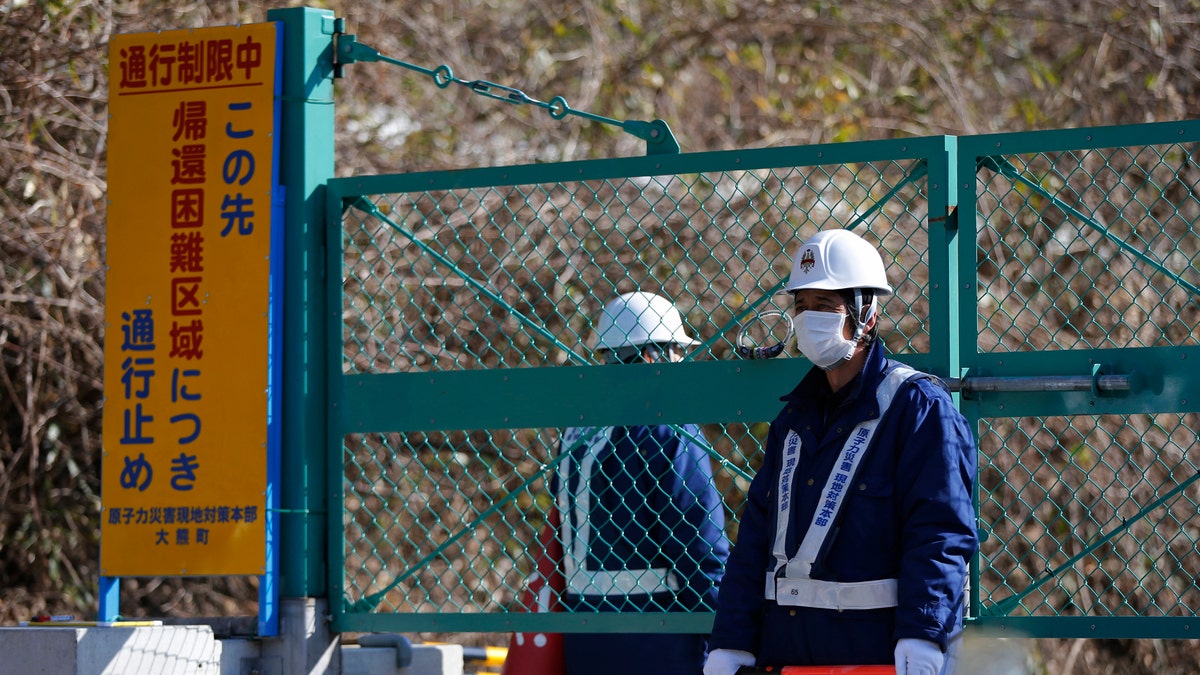
Security personnel stand guard near a steel gate in Fukushima prefecture April 1, 2014. For the first time since the nuclear disaster more than three years ago, residents of a small district 20 km (12 miles) from the wrecked plant are allowed to return home. (REUTERS/Issei Kato)
Japan's Fukushima nuclear reactor meltdown in March 2011 is unlikely to lead to a large number of people developing thyroid and other cancers like after Chernobyl in 1986, U.N. scientists said on Wednesday.
While some children - fewer than a thousand - might have received radiation doses that in theory could increase the risk of thyroid cancer, the probability of that developing also remains low, the United Nations Scientific Committee on the Effects of Atomic Radiation (UNSCEAR) said in a new study.
The Chernobyl reactor explosion sent radioactive dust across much of Europe, while people close to the plant were exposed to radioactive iodine that contaminated milk.
Although Fukushima was the world's worst nuclear disaster since then, the Japanese authorities took action including evacuations that significantly reduced exposure to radioactive substances.
"No discernible changes in future cancer rates and hereditary diseases are expected due to exposure to radiation as a result of the Fukushima nuclear accident," UNSCEAR said in a statement accompanying its nearly 300-page study.
"The expected low impact on cancer rates of the population is largely due to prompt protective actions on the part of the Japanese authorities following the accident."
Nevertheless, the U.N. body's report "notes a theoretical possibility that the risk of thyroid cancer among the group of children most exposed to radiation could increase," it said.
The thyroid - a gland in the neck that produces hormones that regulate vital bodily functions - is the most exposed organ as radioactive iodine concentrates there. Children are deemed especially vulnerable.
UNSCEAR said thyroid cancer was a rare disease among young children and their normal risk was very low.
"The occurrence of a large number of radiation-induced thyroid cancers as were observed after Chernobyl can be discounted because doses were substantially lower," it said.
NO SIGNIFICANT CANCER CHANGE SEEN
In Belarus, Russia and Ukraine, the countries most affected by Chernobyl, more than 6,000 cases of thyroid cancer had been reported by 2005 in children and adolescents who were exposed at the time of the accident, UNSCEAR says on its website.
In Japan on March 11, 2011, a magnitude 9 earthquake and tsunami devastated the Fukushima Daiichi nuclear plant, spewing radiation and forcing about 160,000 people to flee their homes.
UNSCEAR said about 35,000 children aged up to five lived in districts where the average absorbed dose to the thyroid was between 45 and 55 milliGrays (mGy), a radiation measurement.
But doses varied considerably among individuals, from about two to three times higher or lower than the average.
UNSCEAR "considered that fewer than a thousand children might have received absorbed doses to the thyroid that exceeded 100 mGy and ranged up to about 150 mGy," the report said.
"The risk of thyroid cancer for this group could be expected to be increased," it said. UNSCEAR's press statement made clear it was still not seen as a big risk, however, with a headline saying: "Low risk of thyroid cancer among children most exposed."
UNSCEAR said 80 leading scientists had worked on the report - "Levels and effects of radiation exposure due to the nuclear accident after the 2011 great east-Japan earthquake and tsunami" - and that the material was reviewed by its 27 member states.
